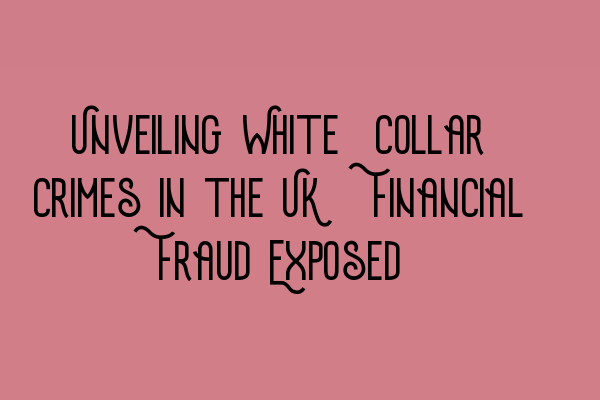Unveiling White-Collar Crimes in the UK: Financial Fraud Exposed
White-collar crimes have become a significant concern in the United Kingdom in recent years. Financial fraud, in particular, has been on the rise, causing serious harm to individuals, businesses, and the economy as a whole. In this article, we will delve into the world of white-collar crimes, specifically focusing on financial fraud, its types, and the legal implications associated with it.
The Scope of Financial Fraud
Financial fraud encompasses a wide range of illegal activities that involve deceptive practices to obtain financial gain. These crimes are typically committed by individuals working in professional occupations, such as bankers, accountants, or executives, who abuse their positions of trust and authority.
One of the most common types of financial fraud is embezzlement, where a person misappropriates funds entrusted to them for personal use. This crime can have severe consequences for businesses, leading to financial losses and potentially jeopardizing their viability.
Another prevalent form of financial fraud is money laundering. Criminals use this method to hide the origins of illegally obtained money by making it appear legitimate. Money laundering poses significant risks to the financial integrity of the UK, as it facilitates other criminal activities and undermines the stability of the economy.
The Legal Consequences
When individuals engage in financial fraud, they can face serious legal consequences. The UK law has provisions in place to combat and punish white-collar crimes, ensuring that offenders are held accountable.
Law enforcement agencies, such as the Serious Fraud Office (SFO) and the Financial Conduct Authority (FCA), play a crucial role in investigating and prosecuting financial fraud cases. They work closely with solicitors specializing in criminal law to gather evidence, build strong cases, and bring the perpetrators to justice.
If you find yourself involved in a financial fraud case, it is imperative to seek legal representation from experienced solicitors who have expertise in white-collar crimes. At SQE Criminal Law & Practice Law UK, our team of skilled solicitors is well-versed in handling complex financial fraud cases and can provide you with the guidance and support you need throughout the legal process.
Protecting Yourself and Your Business
To safeguard yourself and your business from falling victim to financial fraud, it is important to implement robust internal controls, conduct regular audits, and stay vigilant against any suspicious activities. Additionally, educating yourself and your employees about the various types of financial fraud can help in identifying and preventing potential risks.
If you suspect that you have become a victim of financial fraud or have knowledge of such activities taking place, it is crucial to report it to the appropriate authorities. By doing so, you contribute to the fight against financial crime and help protect others from falling prey to fraudsters.
Conclusion
Financial fraud remains a pressing issue in the UK, and it is important for individuals, businesses, and legal professionals to be aware of its prevalence and the legal consequences associated with it. By staying informed and taking the necessary precautions, we can collectively work towards minimizing the impact of white-collar crimes on our society.
For more information on the SQE exams or to explore our preparation courses and practice materials, consider checking out our related articles:
